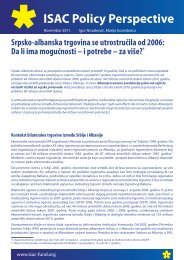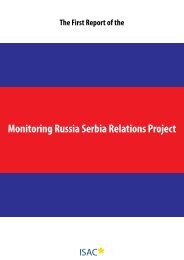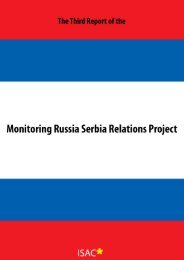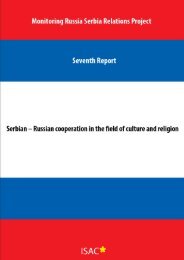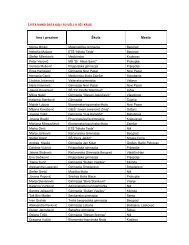the process of security sector reform - ISAC Fund
the process of security sector reform - ISAC Fund
the process of security sector reform - ISAC Fund
Create successful ePaper yourself
Turn your PDF publications into a flip-book with our unique Google optimized e-Paper software.
Dr Timothy Edmunds THE PROCESS OF SECURITY SECTOR REFORM<br />
Dr Timothy Edmunds THE PROCESS OF SECURITY SECTOR REFORM<br />
cratisation through SSR – may well reduce <strong>the</strong> potential for conflict between<br />
neighbours.<br />
Finally, <strong>security</strong> <strong>sector</strong> <strong>reform</strong> is an important factor for those states that want<br />
to integrate more closely with Western Institutions such as <strong>the</strong> EU or NATO<br />
– or associated programmes like PfP. While decisions on membership <strong>of</strong> <strong>the</strong>se<br />
kinds institutions tend to be informed as much by political reasons as by specific<br />
<strong>security</strong> <strong>sector</strong> <strong>reform</strong> successes, it does remain an important factor, particularly<br />
in relations with NATO.<br />
IMPLEMENTATION<br />
That at least is <strong>the</strong> <strong>the</strong>ory and rationale that lies behind <strong>the</strong> <strong>security</strong> <strong>sector</strong> <strong>reform</strong><br />
concept. What does SSR mean in practice though? How does it actually happen?<br />
How is it implemented?<br />
The first point to note is that <strong>security</strong> <strong>sector</strong> <strong>reform</strong> is a <strong>process</strong> ra<strong>the</strong>r than an<br />
end point. International and domestic <strong>security</strong> requirements are always changing,<br />
and all states have to be able to adapt <strong>the</strong>ir <strong>security</strong> <strong>sector</strong>s to meet <strong>the</strong>se<br />
demands effectively. Democracy too is continuous <strong>process</strong>, and all established<br />
democracies adapt and <strong>reform</strong> <strong>the</strong>ir democratic procedures in accordance with<br />
changing circumstances.<br />
For example, <strong>the</strong> terrorist attacks <strong>of</strong> 11 September 2001 have initiated a major<br />
review <strong>of</strong> <strong>security</strong> <strong>sector</strong> controls and priorities in <strong>the</strong> United States. In essence,<br />
<strong>the</strong> US itself – as well as <strong>the</strong> UK and many o<strong>the</strong>r European countries – have been<br />
going through <strong>the</strong>ir own <strong>process</strong>es <strong>of</strong> SSR since 9/11.<br />
Security <strong>sector</strong> <strong>reform</strong> does make particular demands in countries that are in<br />
countries that are going through democratisation or that are emerging from<br />
conflict. Here <strong>the</strong>re is <strong>of</strong>ten no established procedure for democratic control<br />
<strong>of</strong> <strong>security</strong> <strong>sector</strong> actors, despite <strong>the</strong> fact that <strong>the</strong>re may have been very strong<br />
civilian control under <strong>the</strong> old regime.<br />
Security <strong>sector</strong> actors <strong>the</strong>mselves can sometimes be politicised, and used to<br />
playing (or being used to play) a key role in domestic politics. Indeed, in many<br />
countries, <strong>the</strong> <strong>security</strong> <strong>sector</strong> – or at least elements <strong>of</strong> it – may well have been a<br />
key instrument <strong>of</strong> control by <strong>the</strong> old regime, and as a result it might be tied to it<br />
both through its ideology and its own interests.<br />
If a society is emerging from conflict, <strong>the</strong>n <strong>the</strong> <strong>security</strong> <strong>sector</strong> will have to<br />
undergo a fundamental role change from one structured around <strong>the</strong> demands<br />
<strong>of</strong> conflict – in which it is likely to have played a central role – to one more<br />
suited to a peacetime environment. In general this will involve a reduction in <strong>the</strong><br />
size and importance <strong>of</strong> <strong>the</strong> <strong>security</strong> <strong>sector</strong>, and so is likely to directly threaten<br />
<strong>security</strong> <strong>sector</strong> actors’ own sectional interests.<br />
All <strong>the</strong>se factors both make SSR necessary and are potential obstacles in its<br />
way. However, several lessons emerge from <strong>the</strong> experiences <strong>of</strong> o<strong>the</strong>r countries<br />
in <strong>the</strong>se areas.<br />
In particular, it is clear that SSR <strong>process</strong>es in <strong>the</strong> democratising states tend fall<br />
into two overlapping and interrelated phases – ‘first generation’ <strong>reform</strong>s, and<br />
‘second generation’ <strong>reform</strong>s.<br />
• ‘First generation SSR’ concerns <strong>the</strong> establishment <strong>of</strong> new institutions,<br />
structures and chains <strong>of</strong> responsibility for <strong>the</strong> <strong>security</strong> <strong>sector</strong>.<br />
• ‘Second generation SSR’ concerns <strong>the</strong> consolidation <strong>of</strong> previous <strong>reform</strong>s,<br />
and <strong>the</strong> effective and efficient operation <strong>of</strong> institutions and procedures at<br />
a sustainable cost for <strong>the</strong> state and society.<br />
FIRST GENERATION SECURITY SECTOR REFORM<br />
First generation SSR is primarily concerned with <strong>the</strong> establishment <strong>of</strong> appropriate<br />
structures for (democratic) civilian control, and measures to depoliticise<br />
<strong>security</strong> <strong>sector</strong> actors and remove <strong>the</strong>m from partisan intervention in domestic<br />
politics.<br />
Key elements <strong>of</strong> first generation SSR include:<br />
First: <strong>the</strong> establishment <strong>of</strong> clear civilian-dominated chains <strong>of</strong> command. This<br />
ensures that control <strong>of</strong> <strong>the</strong> <strong>security</strong> <strong>sector</strong> remains firmly in <strong>the</strong> hands <strong>of</strong> civilians<br />
14 15








